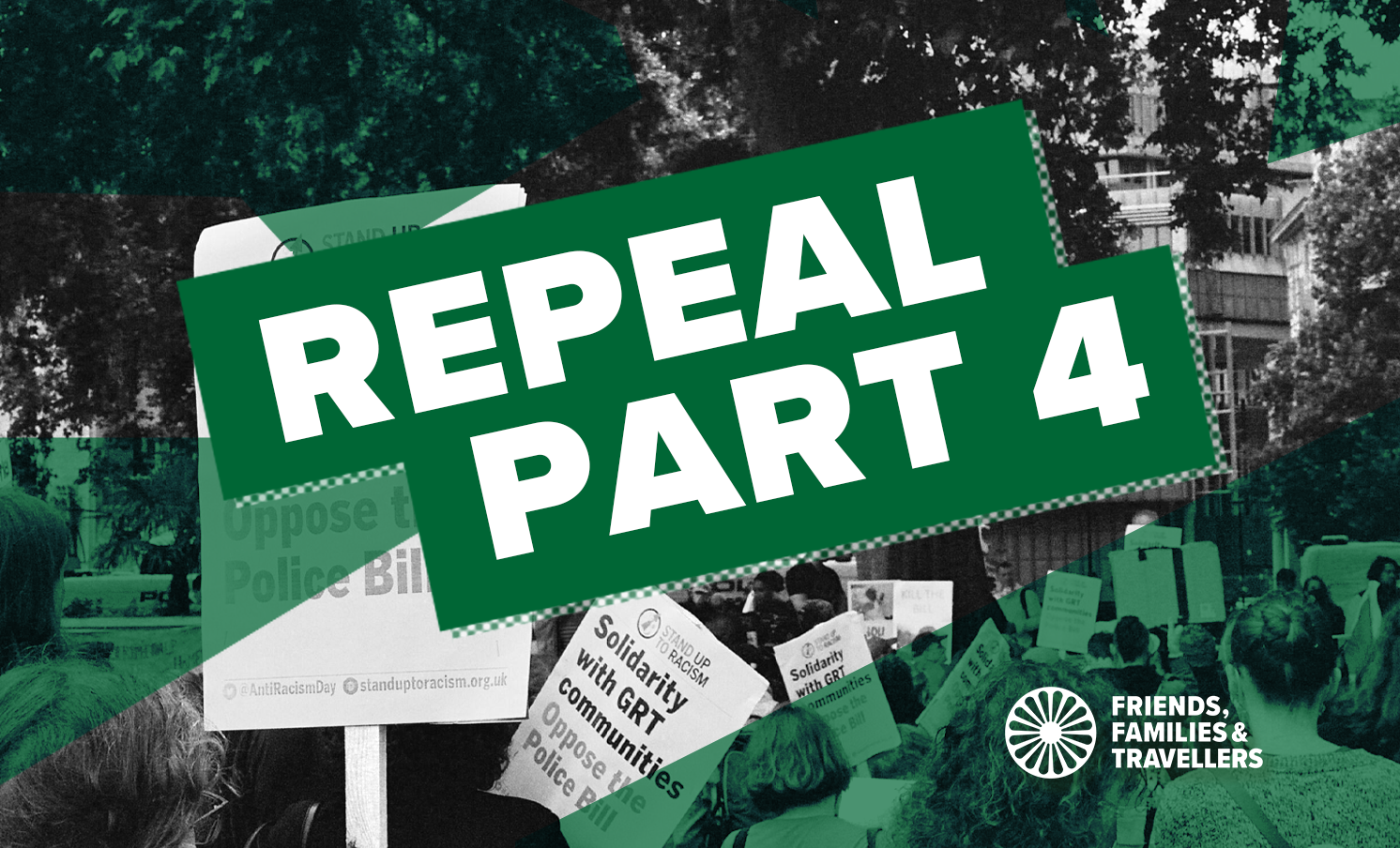Today, Friends, Families and Travellers (FFT) and a coalition of 22 civil society leaders, including Amnesty UK, Liberty, Quakers in Britain, Homeless Link, Right to Roam and wider Gypsy and Traveller civil society, have written to the Policing Minister Dame Diana Johnson DBE MP to call for the repeal of Part 4 of the Police, Crime, Sentencing and Courts Act 2022 (PCSC Act).
The open letter, in full below and here, states that measures brought in by Part 4, including fines and imprisonment, worsen existing inequalities faced by Gypsy and Traveller communities, arguing that Part 4 of the PCSC Act pushes individuals and entire families into the criminal justice system and further increases risks of homelessness and poverty.
The coalition urges the government to prioritise the provision of adequate, culturally pertinent accommodation and stopping places, rather than criminalising people with no place to reside. The letter is part of a wider ‘Part 4 No More‘ campaign by FFT:
Dear Minister,
Re: repeal of Part 4 of the Police, Crime, Sentencing and Courts ActWe write to you as civil society organisations to urge you repeal of Part 4 of the Police, Crime, Sentencing and Courts Act (PCSCA) through the Crime and Policing Bill (2025).
As you will know, Part 4 of the Police, Crime, Sentencing and Courts Act 2022 introduced further police powers against encampments, with the power to ban Gypsies and Travellers from an area for up to 12 months, alongside powers to fine, arrest, imprison and seize the homes of Gypsies and Travellers.
This further legislating against the communities, came in the backdrop of generation upon generation of prejudice and discrimination experienced by Gypsy and Traveller communities.
After a successful judicial review challenge against the new police powers, in May 2024 the High Court ruled that the powers contained within Part 4, which increased the length of time a family could be banned from an area from 3 months to 12 months, were incompatible with the Human Rights Act. The Judge also concluded that, ‘Any decision to seize and retain vehicles or caravans that are used as homes would quite clearly cause real hardship and would involve a very significant interference within interests falling within the ambit of Article 8.’
Government must address this incompatibility with human rights legislation and the Crime and Policing Bill provides an opportunity to address this, by introducing a new clause to repeal all of Part 4 of the PCSCA.
Since the High Court ruling in May 2024, after correspondence on this matter, the Government have acknowledged the judgment and stated that Government are ‘considering the best way forward’. Almost one year has now passed since the High Court issued this declaration of incompatibility with no clear indication as to when this will be addressed.
Further to the judgment itself, human rights bodies have continued to raise concerns about the increasing police powers against Gypsies and Travellers, including most recently (March 2025) the UN Committee on Economic, Social and Cultural Rights, who issued a formal recommendation to the UK Government to repeal Part 4 of the PCSCA.
It is also worth drawing on the police forces and Police Crime Commissioners responses to the Government consultation on the powers (2018), which showed 84% of police responses did not support the criminalisation of unauthorised encampments, with 75% of police responses stating that pre-existing police powers were sufficient and/or proportionate.
The Crime and Policing Bill provides a clear opportunity for the Government to set things right by repealing Part 4 of the Police, Crime, Sentencing and Courts Act 2022. We urge you to introduce a new clause to the Bill to that effect.
Part 4 of the PCSC Act criminalises roadside camps, which disproportionately impacts Romany Gypsy and Traveller communities. The legislation introduced new offences related to residing on land without consent in or with a vehicle, granting authorities powers to seize vehicles—often serving as homes—and impose fines and imprisonment.
Previously, the High Court ruled parts of the PCSC Act as incompatible with the Human Rights Act, and Council of Europe Commissioner for Human Rights, the Joint Committee on Human Rights, the UN Committee on the Elimination of Racial Discrimination, and the UN Committee on Economic, Social and Cultural Rights have all raised concerns or made formal recommendations to the UK Government to repeal Part 4 of the PCSC Act.
On the impact of Part 4 of the PCSC Act, Chief Executive Officer at Friends, Families and Travellers, Sarah Mann, stated:
“Safe stopping places for Gypsy and Traveller families are practically non-existent, and waiting lists for sites are extremely bloated, with no end in sight. Part 4 of the PCSC Act criminalises people for having no safe place to stop, and adds insult to injury for the thousands of Gypsies and Travellers who want to live in peace and free from harrassment.
We’re grateful to our co-signatories across civil society, and this letter is an invitation to the Government to work collaboratively on real solutions that respect people’s rights, address accommodation needs, and foster greater understanding.”
[END]
About Friends, Families and Travellers (FFT)
Friends, Families and Travellers is a leading national charity that works to end racism and discrimination against Gypsy, Roma and Traveller people and to protect the right to pursue a nomadic way of life.
Media Contact
Communications Team
Email: [email protected]
Relevant Resources
‘Letter to Policing Minister for repeal of Part 4 of PCSC Act’. Friends, Families and Travellers, and co-signatories. April 2025. Read.
‘UN calls for repeal of eviction powers against roadside camps in PCSC Act 2022’. Friends, Families and Travellers. March 2025. Read here.
‘New Report: FOI reveals devastating lack of transit site provision’. Friends, Families and Travellers. December 2024. Read report.
‘High Court declares parts of Police Act 2022 in breach of European Convention on Human Rights’. Friends, Famileis and Travellers. May 2024. Read here.

